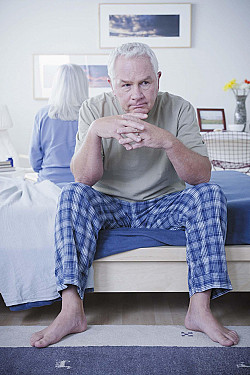Nondrug approaches to improve erectile function
When pills don't help enough, or you just don't want them.
- Reviewed by Howard E. LeWine, MD, Chief Medical Editor, Harvard Health Publishing; Editorial Advisory Board Member, Harvard Health Publishing

Erectile dysfunction (ED) pills have helped millions of men continue to enjoy an active sex life. The drugs work by improving blood flow in the penis to help produce and maintain an erection.
However, like many medications, they're not for everyone. Men may be bothered by side effects, such as headaches, flushing, upset stomach, or dizziness. They also may not like being dependent on the medication. And for some men, ED medications simply do not work.
This doesn't mean that you're out of options for treating your ED. "In many cases, lifestyle changes may slow the progress of ED and help manage it, so you may not need ED medications or have to rely on them as much," says Dr. Marc Garnick, professor of medical oncology and urologic cancer at Harvard-affiliated Beth Israel Deaconess Medical Center.
Here are some nondrug strategies you can try, and how they work.
Do more aerobic exercise. A study in the December 2023 issue of The Journal of Sexual Health found that men who exercised for 30 to 60 minutes, three to five times a week, saw more improvement in their ED than men who did not exercise. The results also showed that the worse a man's ED, the more exercise helped. The men participated in aerobic exercises like walking, running, and cycling, but any activity that raises your heart rate is suitable. Aerobic exercise can help improve blood flow and reduce inflammation, high blood pressure, and stress, factors related to a higher risk for ED.
Watch your waist size. Excess weight increases the risk for ED. Studies have shown that a man with a 42-inch waist is 50% more likely to have ED than one with a 32-inch waist. If you are overweight, reducing your weight by 5% to 10% has been shown to improve sexual function.
Perform Kegels. Kegel exercises strengthen pelvic floor muscles, and some research suggests they may help with ED by increasing blood flow to the penis. A Kegel is done by tightening the muscles you would use to stop the flow of urine or to hold back gas. A typical daily routine consists of doing 30 to 40 reps spread throughout the day. (Learn how to do Kegels at /kegels.)
Eat a plant-based diet. Research suggests that following a plant-based diet, especially the Mediterranean diet, is associated with a lower risk for ED. One study that followed almost 22,000 men ages 40 to 75 found that those who consistently followed a Mediterranean diet had a lower incidence of ED, no matter their age.
Consume more fruit. Fruit is a staple of the Mediterranean diet, but make sure you eat enough. Studies suggest that men who consume at least three portions a week of flavonoid-rich fruit, such as berries, cherries, grapes, apples, pears, and citrus fruit, are more likely to have satisfactory erectile function. Flavonoids are plant compounds that give fruits their vibrant colors and fragrances. They also make arteries more flexible, which increases blood flow.
Try a penile band. For a man whose main ED problem is sustaining an erection, a penile band, also known as an ED ring, may be helpful. The band works by compressing the penile veins. These ringlike devices fasten around the base of the erect penis to keep blood from escaping. They can be purchased online.
Use a vacuum pump. This is another device that can help maintain an erection. You lubricate your penis and place it into an air-tight plastic cylinder that's attached to a handheld pump. Air is pumped out of the cylinder to create a vacuum, which increases blood flow to the penis. It takes about five minutes to get an erection. Remove your penis and fit a penile band around its base to prevent blood from draining. Men taking blood thinners or being treated for a blood disorder should check with their doctor before using a pump.
Image: © Flashpop/Getty Images
About the Author

Matthew Solan, Former Executive Editor, Harvard Men's Health Watch
About the Reviewer

Howard E. LeWine, MD, Chief Medical Editor, Harvard Health Publishing; Editorial Advisory Board Member, Harvard Health Publishing
Disclaimer:
As a service to our readers, Harvard Health Publishing provides access to our library of archived content. Please note the date of last review or update on all articles.
No content on this site, regardless of date, should ever be used as a substitute for direct medical advice from your doctor or other qualified clinician.















